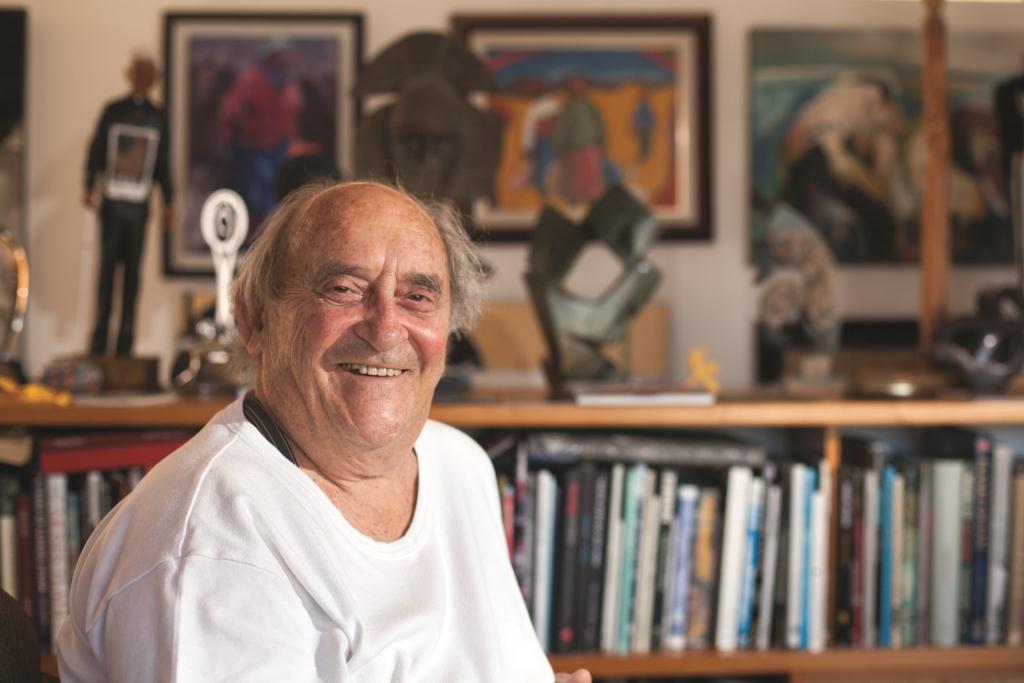Every morning, as the sun rises over the deep blue of Hout Bay near Cape Town, you can catch a glimpse of one of the last survivors of the men who faced death with Nelson Mandela at the Rivonia Trial in 1964.
Denis Goldberg retired to the light and air of Hout Bay, maybe to banish the dark of his stinking Pretoria prison cell where he was incarcerated for 22 years. Here he learned a few sad notes to feed sad souls. As condemned men waited to hang, they would sing their last song. Goldberg taught himself to play along on guitar and recorder.
“I was never good enough to play by ear, but somehow when those men sang, the chords just came to me. When I left, I felt sad that no one was going to hear those notes from my recorder again,” he says.
Fast forward 50 years to a lighter world above the crashing surf of Hout Bay and yet there is no escape from the ills of South Africa.
“I read the negativity, day after day, because scandals sell newspapers; the newspapers which used to be a place of solid analysis for developing ideas and finding solutions to problems. What you read is the absurdity that South Africa is worse today, than what it was under apartheid. How can that be?”
Loading...
On the walls around him is African art; an unspoken statement against the bleak walls of prison. Goldberg points to a portrait of an elegant black man writing in a book.

“He’s not protesting; he’s not toyi-toying; he’s not at a political rally. It turns out that the artist is an anaesthetist and has presumably done a portrait of a colleague in a hospital, writing his diary at the end of the day. A white artist is painting an intellectual activity of a black South African. That for me reflects everything we fought for,” says Goldberg.
These pictures of hope contrast with the less hopeful picture of leadership in Africa.
“Perceptions are important in politics. I have to say President (Jacob) Zuma has played a heroic role in developing the country. He was a herd boy, who gained an education, one way or another, school education, by reading and reading. If you talk to him and speak to him off the cuff, he really is an extremely well-read person in politics. In a discussion, he is fluent and his ideas are fluent. His role in the ANC intelligence apparatus, it was enormous. Creating peace in KwaZulu-Natal, negotiating with leaders brought peace. Mandela started negotiations in Rwanda, Zuma brought them to a climax. That’s his ability. Now, I believe sadly, this circle around him is stealing the democracy of our people.”
Despite misgivings, Goldberg believes that the ANC is the only hope of closing the gap between the rich and poor.
“To oppose the crony economy we have allowed to develop; it’s not going to happen overnight, but we have to start.”
Goldberg says it’s high time to root out corruption.
“[In 1994], one of the first things that happened was new ANC members of Parliament demanded of Nelson Mandela a salary increase…When I said to leading members, ‘why are you looking for this huge increase in salaries, which puts you at the level of white management?’ Their answer was ‘do you think we are not worthy of it because we are black?’”
In the days when Goldberg fought for education, he never dreamed he would see students wreck universities.
“It angers me that students, who are supposed to be the intellectual leaders of the future, don’t think and don’t know our history. Don’t they understand the history of South Africa, don’t they understand how far we’ve come in only 20 years?… Students who throw excrement over a statue think they have solved a problem. Does that solve the problem of accommodation or worker’s wages? What does it create… disgust, and I hope they get charged.”
The protests at Parliament?
“We have serious problems and we reduce them to petty insults, its outrageous behavior. The politics in the media and in Parliament has become politics of personality and not issues.”
Amid the turmoil of politics, Goldberg has a silver lining of his own. He wants to build a center where children can dance, play music and paint in the sea breezes of Hout Bay
“When I watch kids out of the townships, with their patched best clothes, walking up and down with their violins, it’s a joy. Even if they don’t play the damned instrument properly, they had the opportunity to find themselves.”
A search he knew all too well, 50 years ago, when he played along to sad, condemned, voices.
Loading...
